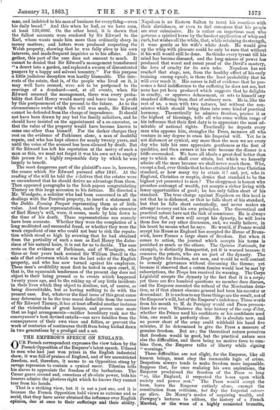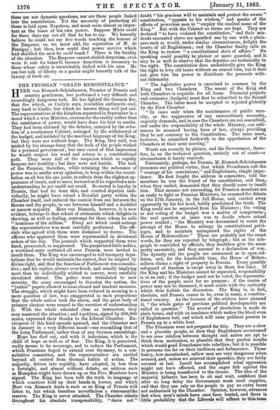THE EMPEROR'S SPEECH ON ENGLAND.
OUR French correspondent expresses the view taken by the French Opposition of the Emperor's latest speech. Uttered to men who had just won prizes in the English industrial show, it was full of praises of England, and of her unrestricted freedom, and, therefore, it seems to an Opposition stung by savage repression to contain a cynical sneer. Tiberius tells his slaves to appreciate the freedom of the barbarians. The Cesar gazes around and, conscious of absolute power, bids his hearers admire the glorious right which he knows they cannot tear from his hands.
That is a striking view, but it is not a just one, and it is because the French Opposition hold views so extreme and so acrid, that they have never obtained the influence over English opinion, due at once to their sufferings and their ability. Napoleon is no Eastern Sultan to taunt his courtiers with their slavishness, or even to feel consoious that his people are over submissive. He is rather an imperious man who governs a spirited horse by the hardest application of whip and curb, but wishes all the while, that, while retaining its strength, it were gentle as his wife's white Arab. He would give up the whip with pleasure could he only be sure that without it his will would still be done. So thinks every tyrant till his mind has become diseased, and the long misuse of power has produced that worst and rarest proof of the Devil's mastery, the love of cruelty for its own sake. Napoleon has not reached that stage, nor, from the healthy effect of his early training among equals, is there the least probability that he will ever reach it. His career is full of evidence that he pos- sesses a fatal indifference to the suffering lie does not see, but none has yet been produced which suggests that he delights in cruelty, or approves debasement, or sets to himself any standard differing from that of ordinary men. He is, like the rest of us, a man with two natures, but without the con- science which should bring them into some kind of practical harmony. Theoretically he admires freedom, praises it as the highest of blessings, tells all who come within range of his influence that their first duty is to appreciate the most ad- mirable of national rights. Practically he deports every man who opposes him, strangles the Press, menaces all who venture in any degree to cross his Imperial will. Yet he is not dishonest or cynical, any more than the man we see every day who bids his sons appreciate gentleness as the first of qualities, and then swears at his wife because the dinner is a trifle overcooked. We have all ideals a great deal better than any to which we shall ever attain, but which we honestly admire all the more because we shall never reach them. Who, except a fool, ever thinks that he has attained the true Christian standard, or how many try to attain it ? and, yet, who in England, Christian or sceptic, denies that standard to be the highest yet presented to men ? The clergyman is honest who preaches contempt of wealth, yet accepts a richer living with fewer opportunities of good; he has only fallen short of his standard. The true charge against Napoleon on this head is not that he is dishonest, or that he falls short of his standard, but that he falls short contentedly, and never makes an attempt to carry out his own principles. The theoretical and practical nature have not the link of conscience. He is always averring that, if men will accept his dynasty, he will leave them free for any other discussion, and, we really believe, in his heart he means what he says. He would, if France would accept his House as England has accepted the House of Bruns- wick, leave France a large share of freedom. But when it comes to action, the journal which accepts his terms is punished as much as the others. The Opinion Nationale, for example, is distinctly Bonapartist, yet it is warned because it censures the priests, who are no part of the dynasty. The Temps fights for freedom, not men, and would be well content to remedy grievances without discussing the throne; yet because it observed that a cotton famine would best be met by subscriptions, the Temps has received its warning. The Corps Legislatif accepts the dynasty by the fact that it is a corps; yet there are five hundred questions no member dare discuss, and the Emperor resented the refusal of the Montauban dote- tion,-as if that almost obscure general had been his ancestor or descendant. It is useless to say these things are the result, not of the Emperor's will, but of the Emperor's indolence. Three words from his mouth to M. de Persigny would end Press prosecu- tions for ever. Whatever the true history of the coup &Rat, whether the Prince used his confidants or his confidants used him, one result is perfectly clear. He is absolute now, and no power short of the army could withhold his hand five minutes, if he determined to give the Press a measure of genuine freedom. But no ; the theoretical nature perceives that freedom would be good, but the practical nature sees also the difficulties, and there being no motive force to com- bine them, the Emperor talks of liberty while signing " warnings."
These difficulties are not slight, for the Emperor, like all human beings, must obey the inexorable logic of crime. Despotism always tends to make freedom more impossible. Suppose that, for once realizing his own aspirations, the Emperor proclaimed the freedom of the Press so long " as, like England, it respected the bases upon which society and power rest." The Press would accept the boon, leave the Emperor entirely alone, exempt the constitution from criticism, but flay the Imperial entour- age alive. De Morny's modes of acquiring wealth, and Persigny's lectures to editors, the history of a French Marshal, or the woes of a highly connected brunette, these are not dynastic questions, nor are these people linked into the constitution. Yet the necessity of protecting all these is laid upon Napoleon, and must seem almost as impor- tant as the bases of his own power. Suppose Mires could for three days say out all that he has to say. We honestly believe he could not say five words touching the honour of the Emperor, or, we must add, the reputation of M. de Persigny ; but then, how could that power survive which had shielded the men he could touch ? There is the fatality of the situation. The Emperor cannot abolish despotism, even were it safe for himself, because despotism is necessary to those whose safety is inextricably linked with his own. He can but talk of liberty as a gaoler might honestly talk of the luxury of fresh air.































 Previous page
Previous page